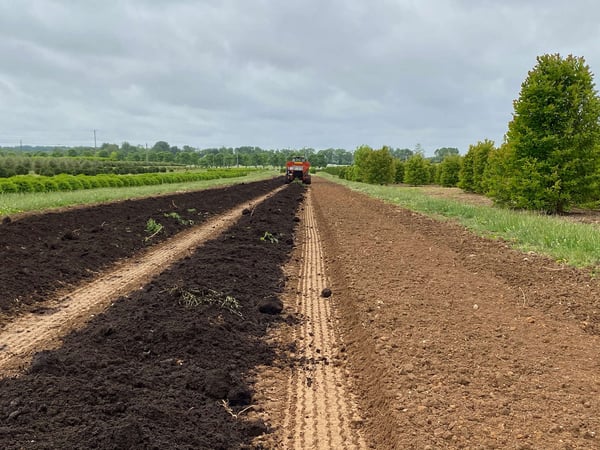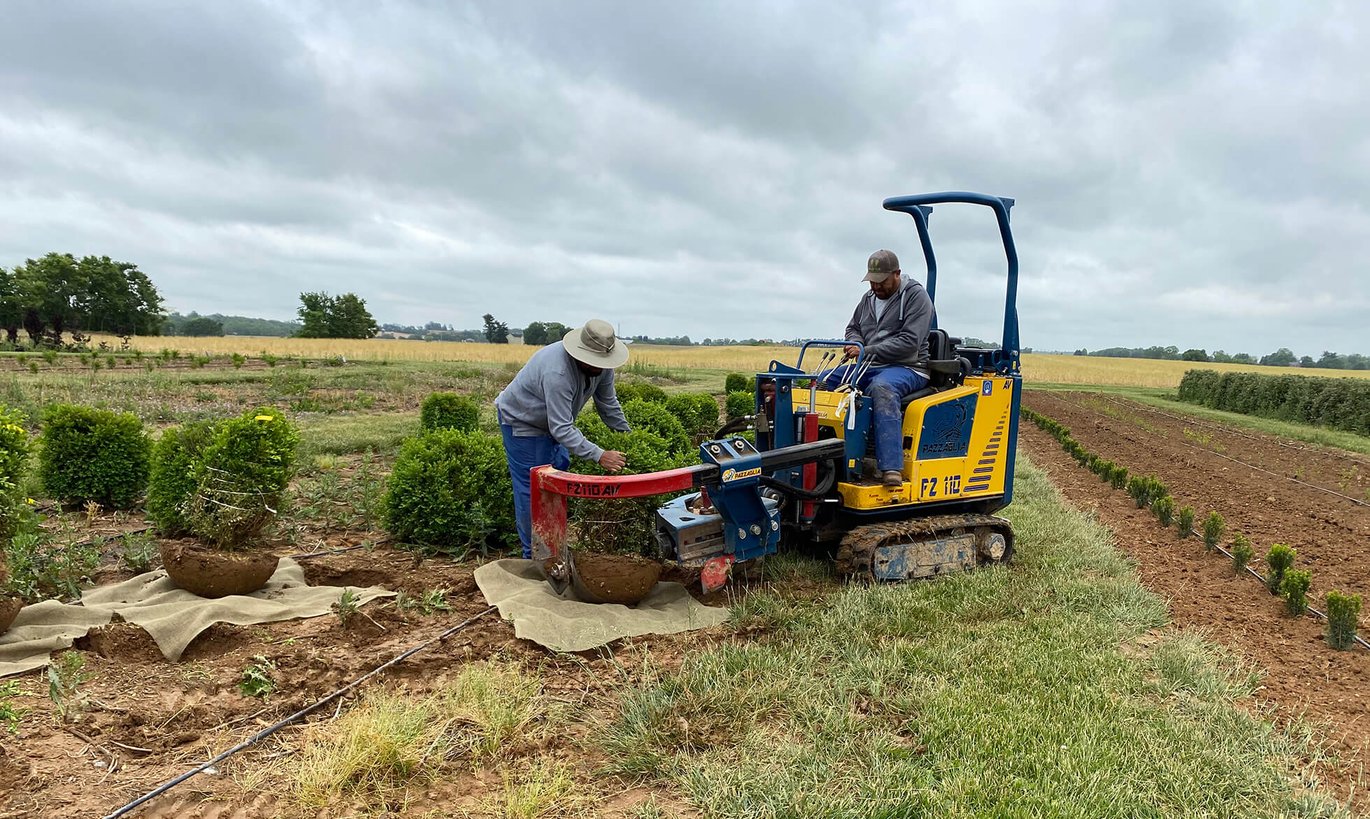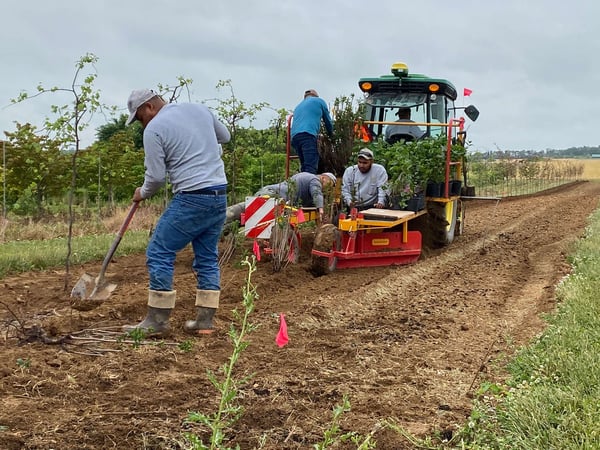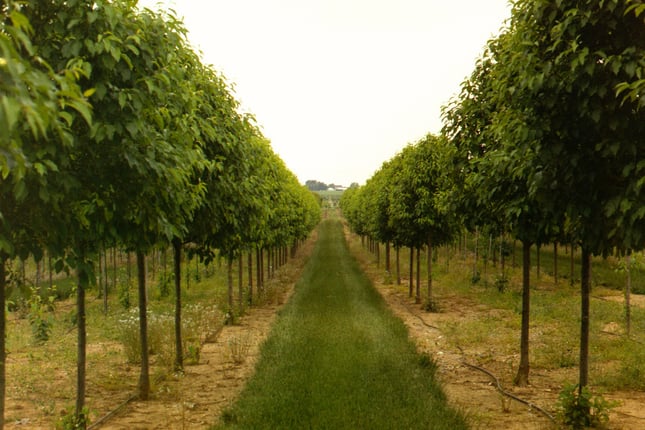In an ideal world, you’d have your go-to wholesale nursery where you would pick up everything you need all in one shot. That, sorry to say, is not the world we live in. And that’s why we have rewholesale distributors. Rewholesalers have to become experts at choosing growers based on their specialties so they can stock their yards with the variety of materials their professional customers need.
Most nurseries don't have every single item in their fields or greenhouses, or if they do the old rule applies that it's hard to do everything well. So you may not be getting the best individual sets of plants if you try to get them all at one nursery. There is no better advice I can give than to know your growers. Or, get to know your rewholesalers and let them choose the growers for you.
Knowing what your growers specialize in will help you plan your purchasing. Focus first on the midsize to large plants on your plan, then move on to the specialty items. Knowing your growers will help you plan better, find what you need when you need it, and get better results.
Which Nurseries Grow What Well?
 How do you get a strong sense of who grows what well? Set aside the time, every few years or so, to have your team go on a nursery tour of your top growers. And maybe visit one or two you haven’t tried that have a solid reputation.
How do you get a strong sense of who grows what well? Set aside the time, every few years or so, to have your team go on a nursery tour of your top growers. And maybe visit one or two you haven’t tried that have a solid reputation.
As a grower, I would love to be able to provide every plant a customer needs, but specialization is necessary in order to produce the level of quality I want to be known for. I’d much rather do that than offer an infinite variety of average easy to grow plants. For instance, we grow a wide variety and volume of hibiscus and boxwood. Not everyone does. We're heavily invested in deciduous shrubs. One of my best friends, a highly respected grower nearby, overlaps with us somewhat, but his main focus is grafted conifers and Japanese maples. And I think that's what people see as his specialty.
A huge nursery operation producing on 2,000 acres may offer just about anything you could ever need, but even there you are going to want to get a sense of what they do really well. Meticulous plant care aside, the soil and prevailing growing conditions are going to dictate what does well and what not so well.
Some nurseries carry an eclectic mix of hard to find plants. The reason for that is because they can do it well. They fill in the gaps where other growers leave off. Here’s an example: A grower near us carries Acer pensylvanicum (striped maple) which is pretty unusual. It’s hard to find. But they do it well. It works for them and, more importantly, for their customers.
Choosing Nursery Plant Sources to Match Project Scope
Most landscapers and landscape architects prefer to order field grown trees and shrubs directly from a nursery. This ensures they can have their plant material freshly harvested and delivered close to the time it will be planted for a project. They tend to order only what they need for single projects–one project at a time.
 For more flexibility with order size and timing of pick up/delivery, the other option is buying from a rewholesale distributor. Rewholesalers buy in volume, stocking up on popular varieties of field grown B&B as well as container grown material. They watch the trends and carefully calculate exactly what will sell quickly to their customers so as to minimize the time those plants spend out of the ground.
For more flexibility with order size and timing of pick up/delivery, the other option is buying from a rewholesale distributor. Rewholesalers buy in volume, stocking up on popular varieties of field grown B&B as well as container grown material. They watch the trends and carefully calculate exactly what will sell quickly to their customers so as to minimize the time those plants spend out of the ground.
Rewholesalers have to be expert at choosing their nurseries precisely because they are buying in volume to serve a large customer base. They rely on their specialist growers to deliver consistently every year so their customers can come to one place to complete a large portion of their plant buying.
Although field-grown plants freshly dug may be the first choice, there’s no denying the convenience of plants that are out of the ground and ready to go–whether B&B or container stock. If you know and trust your re-wholesaler you will know they are healthy and well-cared for before you load them up for delivery to your job site.
Look for Plant Sources Outside Your Own Growing Zone
 Our nursery is located in zone 7, but has a strong customer base to the north in zones 5 and 6. If you buy a plant from here will it survive up there? We pay close attention to that. For instance, we don’t sell crape myrtle up north but it is popular locally in our mid-Atlantic market. Our dogwood and boxwood, on the other hand, have a wide growing range and can do perfectly well to the north of us. The lilacs do even better.
Our nursery is located in zone 7, but has a strong customer base to the north in zones 5 and 6. If you buy a plant from here will it survive up there? We pay close attention to that. For instance, we don’t sell crape myrtle up north but it is popular locally in our mid-Atlantic market. Our dogwood and boxwood, on the other hand, have a wide growing range and can do perfectly well to the north of us. The lilacs do even better.
As growers, we can’t be experts in every plant on every landscape plan that comes our way. We specialize and we try to be knowledgeable about the ideal growing conditions for the plants in which we do specialize. When you get to know us and build that relationship, you will get the best plants for the project. Building strong grower relationships results in strong customer relationships.
We all stand to benefit from high value plant material sold at prices that honestly account for what it takes to produce that value. But how do we know we are purchasing the best plant material for the best price?
Our ebook “Why Accurate Plant Pricing is Good for Everyone” will give you a fresh perspective on the delicate balance between price and value.





